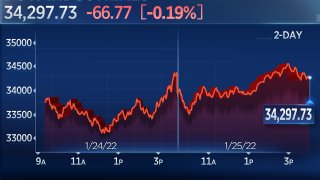
The Dow Jones Industrial Average closed down Tuesday, but well off its session lows in another rollercoaster session as the Federal Reserve prepares investors for tighter monetary policy.
The blue-chip average shed 67.77 points, or 0.2%, to close at 34,297.73. The index swung from a nearly 819-point deficit at its lows to a roughly 226-point rally at its highs during the session. The S&P 500 dipped 1.2% to 4,356.45. The technology-heavy Nasdaq Composite fell 2.3% to 13,539.30.
Tuesday's market action came after the Dow on Monday rallied from a more than 1,000-point loss to close higher for the first time ever. The Nasdaq Composite reversed a 4.9% decline from earlier in the day to finish positive — its biggest rebound since 2008. The S&P 500 also rallied from major losses to close up.
Feeling out of the loop? We'll catch you up on the Chicago news you need to know. Sign up for the weekly Chicago Catch-Up newsletter here.
"The roller coaster trading atmosphere continues," Vital Knowledge's Adam Crisafulli said in a note Tuesday. "The lows from yesterday though haven't been breached."
Banks and energy stocks, sectors that stand to benefit from a recovering economy and higher yields, led Tuesday's comeback. The yield on the benchmark 10-year Treasury note resumed its 2022 gain Tuesday to around 1.78%. Bank of America and Citigroup each gained around 2%. Occidental Petroleum and APA Corp both rose more than 8%.
American Express was the top gainer on the Dow and the S&P 500 after an earnings beat, adding 8.9%. Dow members IBM and Johnson & Johnson were also among the top gainers on the index after reporting quarterly results.
Money Report
Tech shares struggled amid rising rates. Nvidia, down 24% this year, lost 4.5% on the day. Microsoft lost 2.7% ahead of its earnings report after the bell.
General Electric was among the biggest decliners on the S&P 500 with a 6% loss after the company topped quarterly earnings expectations, but missed revenue estimates.
The S&P 500 is down more than 8% in January, on pace for its worst month since March 2020 at the onset of the pandemic.
"I don't think it's done," Liz Young, head of investment strategy at SoFi, told CNBC's "Squawk Box" on Tuesday. "This ... is a digestion process of a new environment that we're not conditioned for."
The 10-year Treasury yield has climbed this year as the Federal Reserve signaled it will begin tightening monetary policy as soon as March with a rate hike. Investors have rotated out of high-growth areas of the market in favor of safer bets. The Nasdaq Composite is in correction territory, down more than 16% from its intraday record.
"Downside risks from monetary tightening are higher vs history. The pain has so far been localized to high valuation stocks, but signs of a broader risk-off are brewing," Barclays' Maneesh Deshpande said in a note Tuesday.
Investors are awaiting policy updates after the Fed's two-day policy meeting ends Wednesday. Market participants want to know when the central bank will raise interest rates and by how much. The Fed is expected to signal a rate hike as soon as March and more policy tightening on the table to address high inflation.
Geopolitical tension at the Russia-Ukraine border continued to loom over markets. President Joe Biden spoke with European leaders Monday amid fears of a possible Russian invasion of Ukraine.






